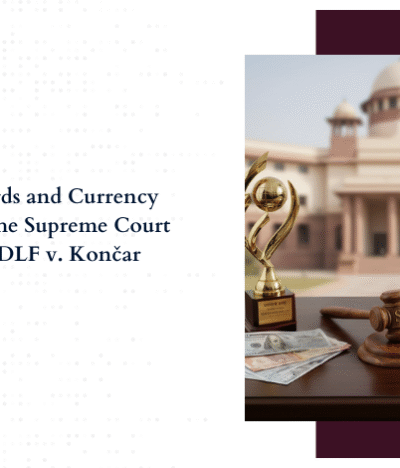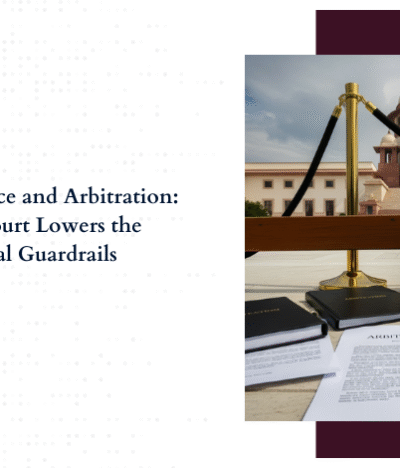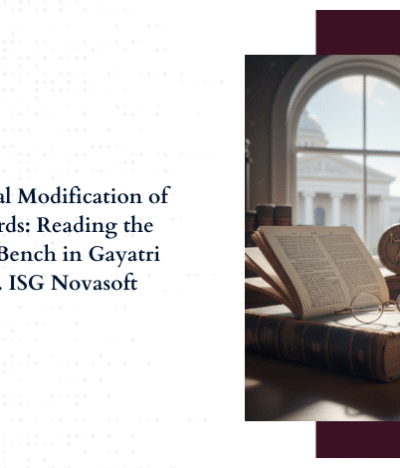Discharge of contract by the way of alteration is an upcoming method of resolving a dispute. Contracts form the backbone of legal and commercial relationships, reiterating the functioning of different groups and their subsequent liabilities towards each other. However, there are situations where parties may not fully perform the terms as originally agreed. Consequently, the discharge of contracts can be done through various means, including breach, performance, or alternative performance. The doctrine of Accord and Satisfaction enumerates one such method for discharge of contract.
The doctrine of Accord and satisfaction provides for a pivotal legal concept allowing the parties involved in any agreement to seek alteration in the mode of performance, thereby leading to discharge of contract. Such a mode of discharge allows flexibility in the performance of the contract, resulting in party satisfaction. This article discusses the legal analysis behind the discharge of contract by accord and satisfaction.
Understanding Accord and Satisfaction
The concept of Accord refers to a new agreement between the contracting parties to alter or settle the original contractual obligation. Satisfaction is the fulfilment of the agreed-upon accord, leading to the discharge of contract.
Pertinently, it occurs when one party offers a substitute for what was originally owed (the accord), and the other party accepts this substitution as performance leading to satisfaction. Subsequently, the original obligation is discharged. This doctrine was elucidated by the court in Boghara Polyfab Case. Key Elements of Accord and Satisfaction
- Offer: One party proposes a substitute performance.
- Acceptance: The other party agrees to this substitute.
- Consideration: There must be something of value exchanged to support the new agreement.
- Performance (Satisfaction): The party who owes the obligation must fulfil the altered obligation.
Legal Requirements of Accord and Satisfaction
- Consensual Agreement
The parties to the original contract must voluntarily agree to the accord. If one party is coerced or misled into accepting the terms, it will not be a valid form of discharge of contract.
- Lawful Consideration
Like any valid contract, there must be consideration for the new agreement. This could be a reduced payment, delivery of different goods, or any other form of consideration that both parties find acceptable.
- Performance of the Accord
As per the altered performance (accord), the obligated party must perform the new obligation. In case of any discrepancy with this performance (satisfaction), the original obligation remains in place and it will not be discharge of contract.
Accord and Satisfaction: A Perspective On the Outcome
Accord and satisfaction can be engaged as a tool of defence against any claim for breach of the original contract. Once the new agreement has been fulfilled, the original contract cannot be enforced. Upon satisfaction of the accord, the original contractual obligations are completely discharged. Neither party can demand further performance under the original contract. In cases of partial performance of the agreed accord, the original contract may still stand unless the accord settles the performance being partially discharged.
Pertinently, the original contract shall still be legal and enforceable if the obligated party has failed to perform under the new agreement (accord). Such an act would amount to breach of the original contractual terms.
Accord and satisfaction can be used as evidence to prove that the parties have mutually agreed to discharge the contract. Courts generally require clear evidence of the accord and its satisfaction to enforce the discharge.
The matters relating to such disputes have been dealt by the Supreme Court of India before the Arbitration and Conciliation Act, 1996 (“Arbitration Act”) on the existence of an arbitration dispute as per the provisions under Arbitration . The Doctrine of accord and satisfaction have been squarely applied by the courts for adjudicating issues related to making reference to an arbitrator.
After the Mayavati Trading Case, the Supreme Court adjudicated that the appointment of an arbitrator under Section 11 of the Arbitration Act be done institutionally and the question into the existence of an arbitration with the parties, which inter alia includes the plea of the said Doctrine, will be determined by the arbitrator itself. It may be noted that the Mayavati Trading Case only ousted the plea of Doctrine being entertained by the Court at the stage of reference under Section 11 of the Arbitration Act and did not negate the Doctrine itself.
Therefore, accord and satisfaction can still be raised before an arbitrator for the purpose of ascertaining the existence of an arbitration agreement between the parties as a legal plea.
Conclusion
Discharge of a contract by accord and satisfaction provides a flexible, practical method for resolution of disputes without holding any party liable for any breach. It provides for a swift settlement by alternating a pre-existing duty. Mutual agreement to change the terms of performance and following through with the agreed satisfaction, can result in discharge of contract without resorting to litigation or damaging their business relationships.
Whether used to settle debts, adjust contractual duties, or resolve disputes, accord and satisfaction plays a vital role in the legal and commercial world. However, both parties must carefully consider the terms of the new agreement and ensure they meet the legal requirements for it to be enforceable. For businesses and individuals alike, understanding this doctrine can be an essential tool in managing contractual relationships effectively.
Expert Legal Solutions for the Discharge of Contract – ACM Legal
For businesses facing contractual challenges, ACM Legal provides expert guidance on the Discharge of Contract. Our legal team specializes in resolving disputes efficiently, ensuring that contracts are discharged in a manner that protects your interests and avoids costly litigation. If you’re exploring alternative methods for discharging a contract, ACM Legal is here to offer tailored legal solutions.
FAQs
1. What is the difference between accord and satisfaction and modification?
Accord and satisfaction engaged in a process of altering the original contractual performance with a new one. It results in an alteration of a pre-existing duty. A modification does not alter the contractual performance, rather abolishes a pre-existing duty which may not require any new performance.
2. Can accord and satisfaction be verbal, or must it be in writing?
The preferred method to adopt accord and satisfaction is in writing to avoid disputes. However, the same can be done in a written format as well.
3. Can one party unilaterally impose accord and satisfaction on the other?
No, accord and satisfaction requires mutual agreement between the parties. Alteration of contractual terms or substitute performance can’t be enforced without the consent of the other party.
4. What happens if the satisfaction (performance of accord) never occurs?
If the contractual performance as per accord doesn’t happen, the original contract remains in effect. The non-performing party may be held liable for breach of the original contract or the new accord resulting in no satisfaction. Therefore, there exists no discharge of contract.
5. Can accord and satisfaction apply to non-monetary obligations?
Yes, accord and satisfaction can be applied in any type of contractual obligation, whether monetary or non-monetary. For example, it could involve the delivery of goods, services, or other modes of performance.
Author: Sunidhi Singh, Associate
Co-Author: Eylah Singh, Intern






